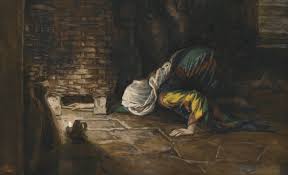Exodus 32:7-14 Psalm 51:1-10 1 Timothy 1:12-17 Luke 15:1-10
Sherman Hesselgrave, Homilist
Nine. Eleven. 2001. Fifteen years ago today—another date that “lives in infamy.” The horrific losses on that day pale when compared to the exponential suffering that has resulted as a direct consequence of the subsequent score-settling. Like all of history, there is nothing we can do to change the past. We can hope that the kind of thinking or believing that led to creating hell on earth for countless people might change, but the lust for power in times of political instability make it a very steep climb, indeed.
Our scripture readings today also speak of losses. But they speak too of recovery after loss, and the lost being found. The Israelites have lost faith in Yahweh who led them out of slavery in Egypt. They have been seduced by the neighbouring Baal-worshipping tribes, and taken to worshipping a golden calf. Moses mediates on their behalf, and they are given the opportunity to make a new beginning.
The writer of the pastoral letter to Timothy speaks of the recovery that can come, even to one who had been an enthusiastic persecutor of Christians, through God’s abundant grace. “Grace,” Frederick Buechner writes, “is something you can never get but only be given. There is no way to earn it or deserve it or bring it about any more than you can deserve the taste of raspberries and cream or earn good looks or bring about your own birth…. There’s only one catch. Like any other gift, the gift of grace can be yours only if you’ll reach out and take it.” [Wishful Thinking: A Theological ABC. pp. 33-34]
In this third year of the lectionary cycle, the gospel we have been reading our way through in a semi-continuous fashion is the Gospel of Luke. About half way through we come to chapter 15, which begins (as we heard today):
One time the tax-collectors and other [notorious] sinners were all gathering around to listen to Jesus. The Pharisees and the teachers of the Law began grumbling, “This man welcomes sinners and eats with them.”
Jesus responds with the parables of the Lost Sheep and the Lost Coin, and a third parable, one we read on the Fourth Sunday in Lent earlier this year: the parable of the Prodigal (or Lost) Son. The Pharisees and the teachers of the Law live in a binary world where things, actions, and people are either clean or unclean. People who were ignorant of the purity code and didn’t live by it were regarded as unclean. But people like tax-collectors were in a special category as they were seen as collaborators with the oppressive Roman state. Collaborators have always been hated. Nazi collaborators in Vichy France were executed by the Resistance. In Apartheid South Africa, those who collaborated with the white regime were often “necklaced” with a tire splashed with gasoline and set afire.
The biblical scholar, Kenneth Bailey, in his book, Finding the Lost Cultural Keys to Luke 15, summarizes Jesus’ three-parable reply to his challengers in conceptual language:
Gentlemen, you accuse me of reclining to eat with the ‘am-ha-‘arets and with tax collectors! Your information is correct. This is exactly what I do. And not only do I let them in—I go out into the streets and shower them with affection, urging them to come in and eat with me!
The story of Zacchaeus, the sycamore tree-climbing tax collector whom Jesus invites to dinner a few chapters hence, is another example.
Let’s take a closer look at the two parables before us today: the Lost Sheep and the Lost Coin. Something else Kenneth Bailey points out with regard to this passage is that, while there are numerous references in the Hebrew Scriptures to God as Israel’s shepherd, by the time we get to the encounter between Jesus and his antagonists, the occupation of ‘herdsman’ is not kosher, so to speak. Shepherds were always grazing their sheep on other people’s land, which put them in the “unclean” column. So, when Jesus begins his reply to his challengers by saying: “Which one of you, having a hundred sheep and losing one of them does not leave the ninety-nine…and go after the one that is lost until he finds it?” Not only is Jesus asking them to imagine they are shepherds, but he’s telling them they are BAD shepherds—for LOSING the sheep they had been given. But because the language of parables is metaphoric, Jesus is not talking about shepherds of sheep, but shepherds of people, just as earlier in his ministry, he told his first disciples that they would become “fishers of people.”
The binary universe of the purity code—clean and unclean—was not the way forward if God’s reign on earth was to be realized, and Jesus was naming names as to who was getting in the way.
When you look around the world today, people are still waging war using the clean/unclean paradigm, only the categories have different labels: believers/infidels, right race/wrong race, powerful/powerless, rich/poor, etc. In the parable, recovery is the result of being found and being brought back into the community of the whole flock.
In the second parable, Jesus likens his tormentors to a careless woman who has lost a precious coin. (Bailey notes that in “Middle Eastern culture a speaker cannot compare a male audience to a woman without giving offence.”) By making a woman the hero of the story, both Jesus and Luke affirm the intrinsic value of both sexes in God’s sovereign realm. The missing drachma represents a day’s wage for a labourer, so it would have been of significant value to the household finances. The woman knows it is somewhere in the house—perhaps it has fallen in a crack between stones in the floor, or it has rolled into a dark corner. Whatever, she doesn’t quit until it has been found.
As in the first parable, it’s not really about a lost coin, but about a lost soul, and caring for everyone who has intrinsic value as a child of God. If the angels in heaven rejoice whenever a lost soul is found, why is it impossible for the Pharisees to join in? It seems to me that they are not able to see beyond the paradigm they have constructed. Clean or unclean—that is their question, and there they are trapped.
When you stop to reflect on these parables, the ones who are lost are the ones who continually take issue with Jesus’ modelling of God’s generous grace.
Calls for justice for all God’s children continues to generate conflict today. There are people unwilling to accept the witness of Black Lives Matter. Others aren’t convinced there’s much that can be done about missing and murdered women. Others would rather argue about which bathroom a trans person should use.
Jesus asks his harassers to imagine themselves in another’s situation. It may be only a beginning, but it could be the first step leading to recovery and reconciliation after the deep losses so many have felt.
In the Toronto Star yesterday, Tony Burman published the five lessons he has learned from the ashes of September 11, 2001. Two of them could have come from the lips of Jesus:
• Revenge as policy never works
• Terrorism doesn’t come from nowhere
If we want the future to look different from the past, then we continually have to stomp down the barriers that people keep erecting or reinforcing that divide us from one another. It is God’s will that everyone has a place at the table; all are welcome under God’s roof. And we are either part of the solution or part of the problem. We each have a choice.






